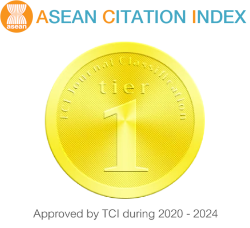The Surveillance, Prevention and Control of Coronavirus Disease 2019 in Communities by Village Health Volunteers in North East Thailand
Keywords:
coronavirus 2019, COVID-19, village health volunteerAbstract
This mixed method research aimed to learn lessons leading to policy suggestions from the implementation of surveillance, prevention and control of Coronavirus Disease 2019 (COVID-19) pandemic in communities by village health volunteers (VHVs) in the north-east, Thailand. The lessons were extracted through a 5 steps process; project preparation or definition, data collection, verification and synthesis of data, storage of data and dissemination of learning. The sample size consisted of 207 VHVs from 8 provinces of health regions 7, 8, 9, and 10. Data were collected by 16 focus group discussions (12-13 members in a group) and a questionnaire survey based on practice guidelines for VHV on surveillance for COVID-19 as defined by the Department of Health Services Support, Ministry of Public Health. The questionnaire validated by 3 experts and achieved a reliability score of 0.94. The quantitative data were analyzed by descriptive statistics and qualitative by content analysis. Quantitative analysis, found 97.6% of VHVs respondents performed searching and screening of high risk groups, 89.4% conducted home visits to follow-up on sign and symptom, 87.0% prepared themselves for protection, 86.0% created performance reports and 84.5% consolidated reports of high-risks groups under observation. The VHVs were under the top-down guidance of the district-level Department of Disease Control’s policies. The qualitative analysis revealed that the VHVs were an integral part of village-level prevention strategy. The VHVs took steps to ensure self-precaution while visiting houses similar to disease control officers. The VHV also communicated with villagers regarding risks, disease knowledge including distributing protective equipment. The VHVs continuously reported to the local health professionals via LINE groups and other applications. The success of the project was attributable to the local VHVs and their dedication including their volunteer compassion, in addition, cooperation between networks and the communities, support, and monitoring. However, limitations were the knowledge, skills, technology including lack of clear operation guidelines, insufficient protective equipment, levels of cooperation between networks and citizens. Therefore, policies suggestions were on development of management infrastructure, capacity building of VHVs potential and knowledge, guideline and operation handbook, management of information technology and the network integration.
References
Mamana S, Iamsirithaworn S, Uttayamakul S. Coronavirus disease-19 (COVID-19). Journal of Bamrasnaradura Infectious Diseases Institute 2020;14(2):124-33. (in Thai)
Order the prime minister’s office 6/2563. Re: Arrangement of the Structure of the Centre for COVID-19 Situation Administration (CCSA) [Internet]. [cited 2021 June 22]. Available from: http://web.krisdika.go.th/data/slideshow/File/43_165158_6_2563_Eng.pdf.
Public Health Support Division, Ministry of Public Health. Performance report of VHVs in surveillance for Coronavirus Disease 2019 (Covid-19) in the community [Internet]. [cited 2020 Jul 14]. Available from http://www.thaiphc.net/new2020/save_covid_report/. (in Thai)
Public Health Support Division, Ministry of Public Health. Village health volunteers (VHVs) manual [Internet]. [cited 2020 Jul 9]. Available from: http://phc.moph.go.th/www_hss/data_center/dyn_mod/OSM_Doctor.pdf. (in Thai)
Ministry of Public Health. Practice guidelines for the village health volunteers (VHVs) on surveillance for Coronavirus Disease 2019 (Covid-19). Nonthaburi: Department of Health Service Support; 2020. (in Thai)
Department of Health Service Support. Manual for strengthening village health volunteer. Bangkok: Ministry of Public Health; 2019. (in Thai)
Krassanairawiwong T. Improve potential of VHVs with quality work. Bangkok: Ministry of Public Health; 2019. (in Thai)
White M, Cohan A. A guide to capturing lesson learned [Internet]. [cited 2020 Sep 17]. Available from www.conservationgateway.org; 2016.
Nyumba TO, Wilson K, Derrick MN. The use of focus group discussion methodology: insights from two decades of application in conservation. Methods in Ecology and Evaluation 2018;9(1):20-32.
World Health Organization. Minimum requirements for infection prevention and control. Geneva: World Health Organization; 2019.
Nawsuwan K, Singweratham N, Theppakson P. Composition and indicators for successful implementation of novel Coronavirus (COVID-19) in the community of village health volunteers (VHVs) in Thailand. The Southern College Network Journal of Nursing and Public Health 2020;7(2):ก-จ. (in Thai)
Department of Health Service Support. VHV’s guideline knocking on the door of the house against COVID-19. Nonthaburi: Department of Health Service Support; 2020. (in Thai)
Barcelos TN, Muniz LN, Dantas DM, Cotrim Junior DF, Cavalcante JR, Faerstein E. Analysis of fake news disseminated during the COVID-19 pandemic in Brazil. Rev Panam Salud Publica 2021 [cited 2021 Jul 12];1-8. Available from: www.paho.org/journal. doi: http://doi.org/10.26633/RPSP.2021.65.
Kaweenuttayanon N, Pattanarattanamolee R, Sorncha N, Nakahara S. Community surveillance of COVID-19 by village health volunteers, Thailand. Bull World Health Organ. Am 2021 [cited 2021 Jul 10];99:393-97. doi: http://dx.doi.org/10.2471/BLT.20.274308.
VandeWeed C, Lauzardo M, Lowenkron J, Morris JG, Tyndall JA, Nelson DR, et al. Patient-centered Covid-19 screening in a community of older adults: combining educational and research components. NEJM Catalyst [Internet]. [cited 2021 Jun 11]. Available from: https://events.catalyst.nejm.org.
World Health Organization. Thailand launches “New Normal” system to build back better after COVID-19 [Internet]. [cited 2020 Jul 12]. Available from: https://www.who.int.
Kamara FM, Mokuwa EY, Richards P. How villagers in central Sierra Leone understand infection risks under threat of Covid-19. PLOS ONE 2020; Jun 24:1-7 [Internet]. [cited 2021 Jun 24]. Available from: https://doi.org/10.1371/journal.pone.0235108.
Downloads
Published
How to Cite
Issue
Section
License
Copyright (c) 2025 Journal of Health Systems Research

This work is licensed under a Creative Commons Attribution-NonCommercial-NoDerivatives 4.0 International License.
Journal of Health Systems Research is licensed under a Creative Commons Attribution-NonCommercial-NoDerivatives 4.0 International (CC BY-NC-ND 4.0) license, unless otherwise stated.




